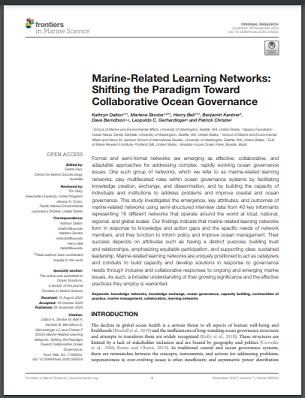
Formal and semi-formal networks are emerging as effective, collaborative, and adaptable approaches for addressing complex, rapidly evolving ocean governance issues. One such group of networks, which we refer to as marine-related learning networks, play multifaceted roles within ocean governance systems by facilitating knowledge creation, exchange, and dissemination, and by building the capacity of individuals and institutions to address problems and improve coastal and ocean governance. This study investigates the emergence, key attributes, and outcomes of marine-related networks using semi-structured interview data from 40 key informants representing 16 different networks that operate around the world at local, national, regional, and global scales. Our findings indicate that marine-related learning networks form in response to knowledge and action gaps and the specific needs of network members, and they function to inform policy and improve ocean management. Their success depends on attributes such as having a distinct purpose, building trust and relationships, emphasizing equitable participation, and supporting clear, sustained leadership. Marine-related learning networks are uniquely positioned to act as catalyzers and conduits to build capacity and develop solutions in response to governance needs through inclusive and collaborative responses to ongoing and emerging marine issues. As such, a broader understanding of their growing significance and the effective practices they employ is warranted.










